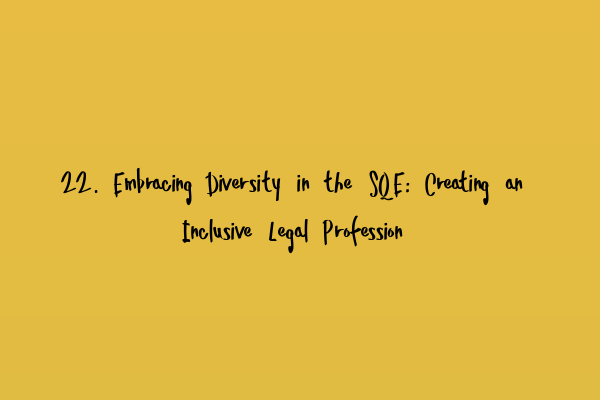Embracing Diversity in the SQE: Creating an Inclusive Legal Profession
The legal profession has long been seen as lacking in diversity and inclusivity. Historically, the industry has been dominated by a narrow demographic, creating barriers for individuals from underrepresented backgrounds. However, with the introduction of the Solicitors Qualifying Exam (SQE), there is an opportunity to address this issue and create a more inclusive legal profession.
The Importance of Diversity
Diversity is vital for any industry to thrive. It brings together a variety of perspectives, new ideas, and innovative approaches to problem-solving. In the legal profession, diversity is not just a matter of social responsibility; it directly impacts the quality of legal services provided. Clients come from diverse backgrounds and they deserve legal professionals who understand their unique circumstances and can effectively advocate for them.
By embracing diversity, the legal profession can better serve its clients and ensure that justice is accessible to all. It also brings about a more balanced and harmonious workplace, fostering a culture of inclusivity that attracts and retains talented individuals from different backgrounds.
The SQE’s Role in Promoting Diversity
The SQE has the potential to revolutionize legal education and create a more inclusive profession. As the new route to qualification as a solicitor in England and Wales, the SQE aims to remove some of the barriers that have traditionally limited access to the legal profession.
One of the ways the SQE promotes diversity is by offering flexibility in the way candidates can qualify. It recognizes that people come from different educational backgrounds and have varied life experiences. The SQE’s modular structure allows candidates to demonstrate their competence in different areas of law, accommodating those who may have gained legal knowledge through alternative means.
Moreover, the SQE focuses on assessing practical legal skills rather than theoretical knowledge alone. This change in emphasis provides a level playing field for candidates and allows them to showcase their abilities in a more meaningful way. It recognizes that success in the legal profession goes beyond memorizing statutes and case law; true competency lies in the practical application of the law.
Inclusive Learning and Support
In order to truly embrace diversity, the SQE must also prioritize inclusive learning and support. It should ensure that candidates from all backgrounds have the necessary resources and guidance to succeed in their studies.
One way to promote inclusivity is through the availability of comprehensive SQE preparation courses. These courses, such as the ones offered by FQPS, provide candidates with the knowledge and skills necessary to excel in the exam. They cover all areas of the SQE syllabus and offer practice exams and mocks to familiarize candidates with the format of the exam.
Additionally, support networks and mentorship programs can play a crucial role in creating an inclusive legal profession. These initiatives provide guidance, advice, and networking opportunities for aspiring solicitors from underrepresented backgrounds. They foster a sense of belonging and ensure that individuals from diverse backgrounds have equal access to career development opportunities.
Looking Towards the Future
The introduction of the SQE is a significant step towards creating a more inclusive legal profession. By embracing diversity and providing equal opportunities for all, the industry can benefit from fresh perspectives, increased innovation, and improved client service.
However, the work does not end with the implementation of the SQE. Ongoing efforts must be made to address unconscious bias, promote diversity within law firms and legal organizations, and support individuals from underrepresented backgrounds throughout their legal careers.
By recognizing the importance of diversity, promoting inclusivity, and continuously striving for improvement, the legal profession can truly create an environment where talent knows no boundaries.
CSS:
.post {
font-family: Arial, sans-serif;
font-size: 16px;
line-height: 1.5;
text-align: justify;
margin: 20px;
}
h2 {
font-size: 24px;
font-weight: bold;
margin-bottom: 10px;
}
h3 {
font-size: 20px;
font-weight: bold;
margin-bottom: 10px;
}
p {
margin-bottom: 20px;
}
